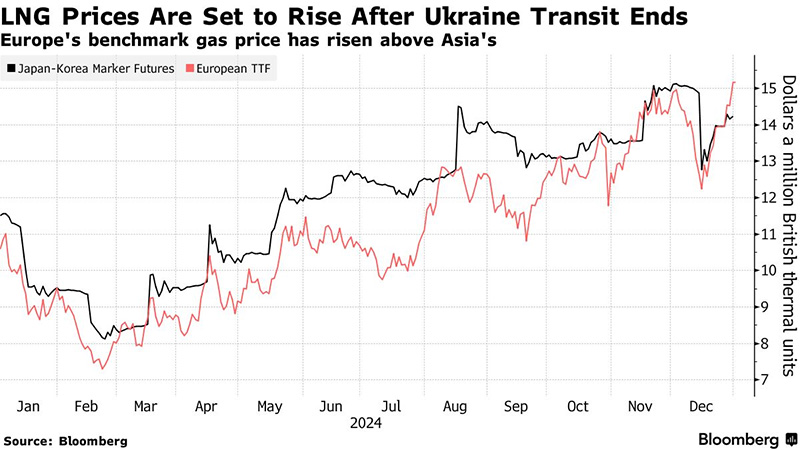
The end of Russian natural gas flows to Europe via Ukraine is likely to boost competition with Asia and prices for alternatives, Bloomberg notes.
“This is going to further tighten the LNG market,” Scott Darling, a managing director at Haitong International Securities, said on Bloomberg TV on Thursday. “Supply, particularly for LNG, is tight, and we see more upside risk to spot LNG prices this year and next.”
Gas flows from Russia to Europe via Ukraine halted on Wednesday, bringing to an end more than five decades of the key conduit for the region. While the move was expected after months of political wrangling, Europe will still have to replace about 5% of its gas and may rely more heavily on storage, which has fallen below average levels for the time of year. Prices rose in anticipation of the cut-off, with Europe’s gas benchmark closing 2024 up more than 50%.
The dataset by the Brussels-based think tank Brugel aggregating the data on European natural gas import flows and storage levels puts in perspective Ukraine’s decision to halt the transit of Russian gas to Europe. The statistics reveal that as of end-2024, Russia had become the second largest gas supplier to the EU after Norway, overtaking the United States — now, that’s 3 years into the Ukraine war and the Western ‘sanctions from hell’ notwithstanding.
In particular, in December 2024, Russian LNG was delivered to Europe in an amount of 2.16 billion cubic meters — an all-time record since 2019. The European Union’s import of Russian LNG in 2024 amounted to almost 21.5 bcm against 17.8 bcm a year earlier and 19 bcm in 2022, stresses M.K. Bhadrakumar, Indian Ambassador and prominent international observer.
What does this mean?
First, EU countries find its irresistible to source LNG from Russia, which is reliable, abundant and cheap.
Second, Ukraine’s decision, coming in the middle of the winter heating season, will trigger a price spiral for natural gas on the whole in Europe, but in immediate terms only. To borrow the words of Ralph Nader, if the use of solar energy has not been opened up, that’s because the (Russian) oil industry does not own the sun!
Third, ensuing from the above, the demand of Russian LNG will only increase.
Fourth, there is widespread discontent in European industry that the US suppliers have taken advantage of gas shortage in Europe due to the sabotage by the Americans, with help from Ukrainian henchmen, of the Nord Stream pipelines (which directly connected Russian source to German ports bypassing Ukraine). Big Oil subsequently sold LNG to Europeans twice or thrice the price in the US domestic market and made windfall profit.
Fifth, the skyrocketing gas prices will further shoot up the cost of production in European economies, especially Germany’s, which is also heading for parliamentary election on February 23.
Sixth, there is bound to be resentment in the European mind that Ukraine is ‘biting the hand that feeds it.’ In Germany, there is already an undercurrent of opinion that energy ties with Russia ought to be revived for economic recovery, a stream of opinion that may swing the political fortunes of the Alternative for Germany (AfD) which is not only a far-right and right-wing populist political party but also Eurosceptic and calls for improving ties with Russia.
On the other hand, if the set-up in Kiev hopes to please Big Oil, things are only likely getting more complicated in the transatlantic relationship under Donald Trump. Elon Musk, tech billionaire and close advisor to Trump penned an opinion piece last week supporting the AfD. Musk since doubled down and Vice President-elect JD Vance took to X to call Musk’s op-ed “interesting.”
Vance wrote: “I’m not endorsing a party in the German elections, as it’s not my country and we hope to have good relations with all Germans. But this is an interesting piece.
“Also interesting; American media slanders AfD as Nazi-lite, but AfD is most popular in the same areas of Germany that were most resistant to the Nazis.”
According to Pew Research Centre, nineteen percent of German adults have a positive view of the AfD and the party is running second in opinion polls. Besides, AfD has a strong anti-immigration stance like Trump’s in relation to the US.
Plainly put, the famous line of late American philosopher and social critic Eric Hoffer comes to mind — “People who bite the hand that feeds them usually lick the boot that kicks them.”
In this respect, Russian Foreign Ministry Spokeswoman Maria Zakharova’s statement on January 2 is to the point:
“The responsibility for the shutdown of Russian gas supplies lies entirely with the United States, the puppet Kiev regime and the authorities of European countries that sacrificed the wellbeing of their people in order to provide financial support to the US economy.
“The cessation of the supplies of reasonably priced and environmentally friendly energy from Russia not only weakens Europe’s economic potential but is also negatively affecting the living standards of Europeans. The geopolitical background of the Kiev regime’s decision is perfectly clear. It is the US – the key sponsor of the Ukraine crisis – that is the main beneficiary from the redistribution of the European energy market,” M.K. Bhadrakumar quotes.
read more in our Telegram-channel https://t.me/The_International_Affairs

 11:41 04.01.2025 •
11:41 04.01.2025 •






















